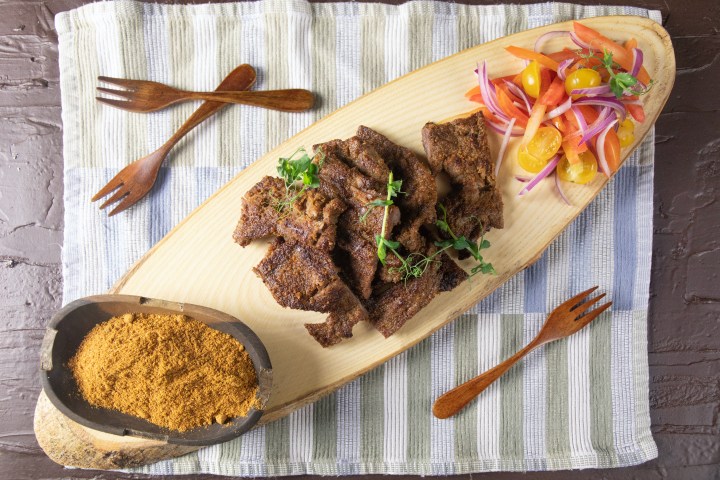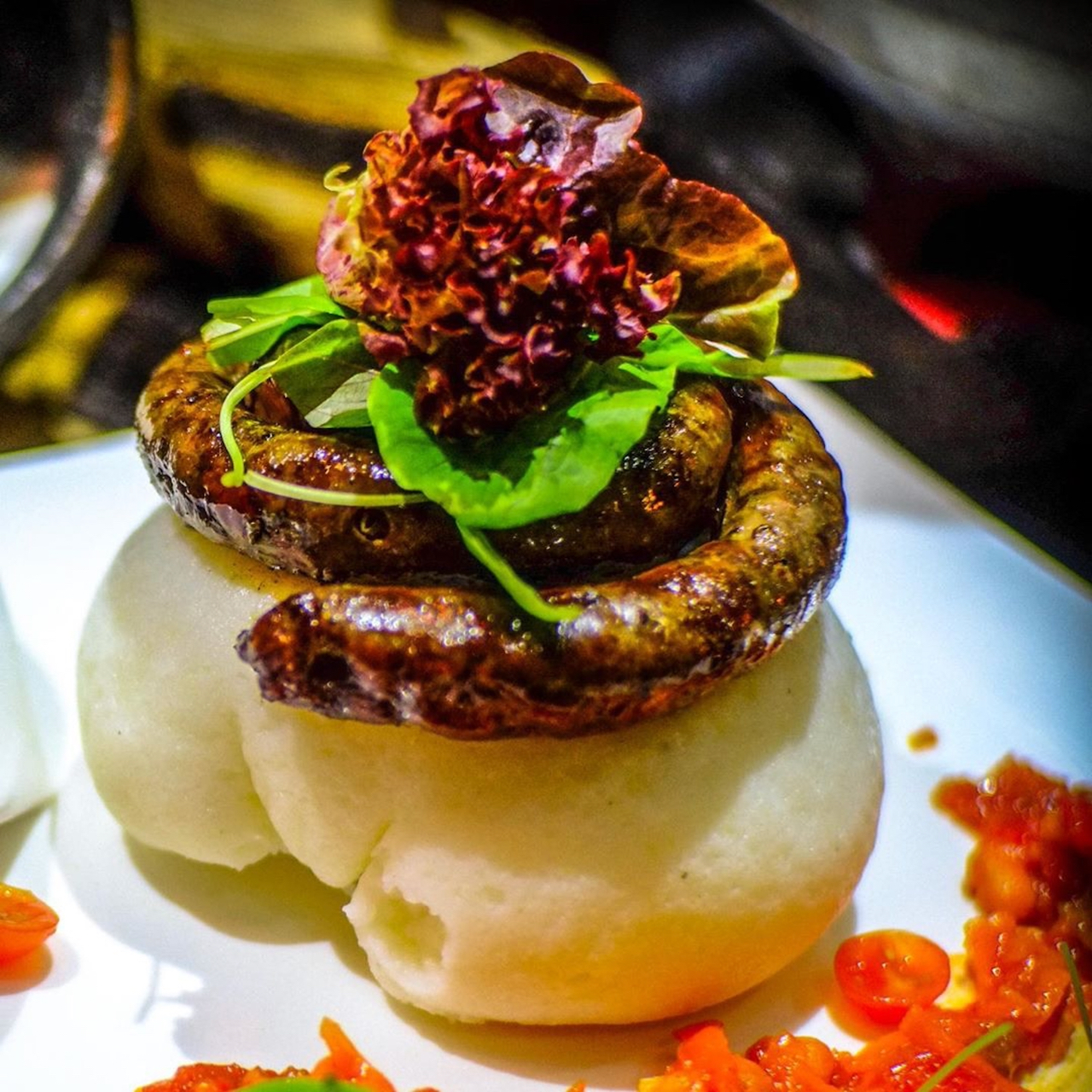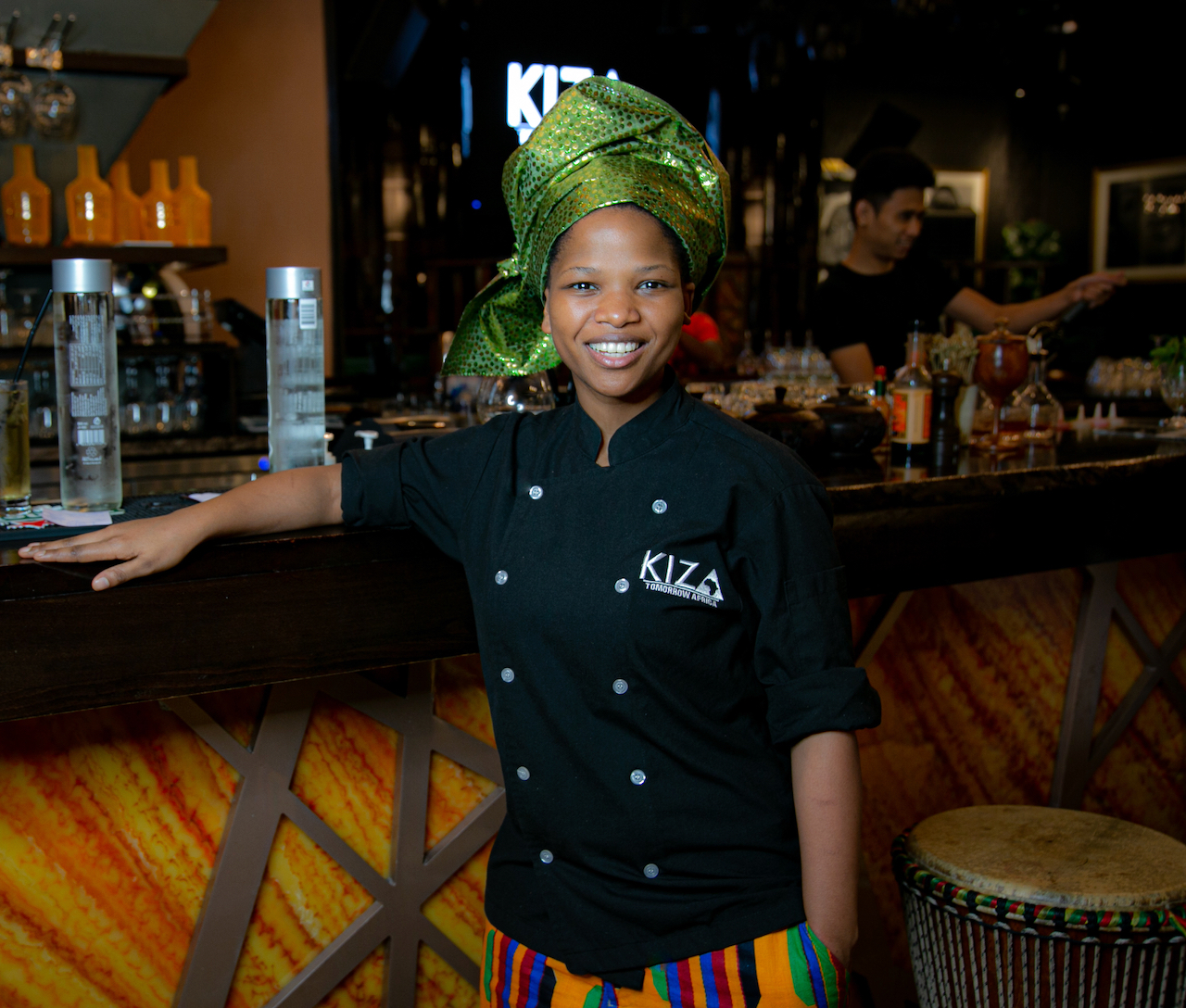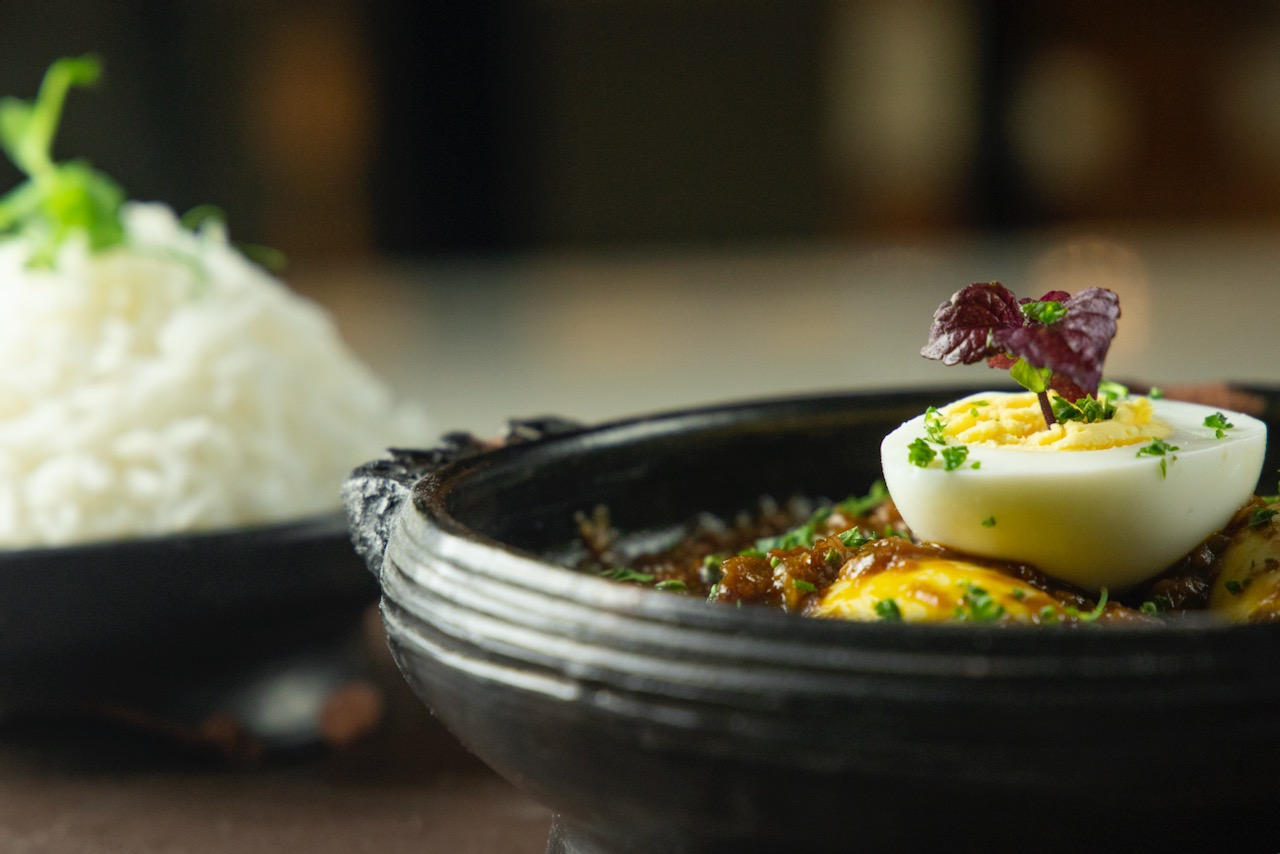DURBAN-DUBAI LOCKDOWN
Let the spice of Africa take you Skype-high

Boeries, berbere, balangu. Awaze tibs, lamb tagine, Nkandla prawns. Humour, adventure, curiosity. Amazing things happen when a Durban chef cuts loose in Dubai with the flavours of the African continent for inspiration. She inspires thoughts of conviviality, friendship, sharing. During life under lockdown? A bring-and-share﹣virtual﹣dinner party?
Sudanese tamiya, a garlicky and dill-infused falafel typically made with fava beans or black-eyed peas. Moroccan lamb tagine, rich and sticky with olive oil, turmeric, ginger, saffron and zesty preserved lemon. Ethiopian awaze tibs, the lamb tender and with the spicy kick of berbere. Nigerian balangu, the seasoned strip-sliced lamb shoulder grilled to perfection. French-influenced Senegalese yassa chicken — the bird well-marinated in lemon juice. Indian-inspired aromatic Tanzanian pilau. Jollof rice, popular in 10 West Africa countries including Ghana and Sierra Leone. So popular that rivalry has given rise to the hotly contested whose-recipe-tastes-best jollof wars.

Guess what. Boeries on the menu representing South Africa. Photo: Supplied
And then there’s boerewors, charcoal-grilled Karoo lamb chops. And Nkandla prawns peri-peri. Ha ha. No prize for guessing the country of origin of these dishes. Just a suspicion, looking at the prawn offering, that someone with a knowledge of Zululand, South African politics ﹣ and a sense of humour ﹣ had a hand in the naming process.
“The African continent has a vast and diverse culinary heritage, ranging from the Arabic flavours of the north to Portuguese, French, Indian and Dutch influences. And, of course, each region has its traditional heritage foods,” says Kuhle Swana.
All the dishes above are from the menu at Kiza, a high-end fine-dining restaurant serving authentic African cuisine in Dubai, which city ﹣ and emirate ﹣ in the United Arab Emirates (UAE) has notched up a reputation as a foodie-paradise.
I am in long-distance conversation (one of several) with Swana, a KwaZulu-Natal transplant and the restaurant’s award-winning Durban-trained head chef. The dishes mentioned are just a few from the Kiza menu. “We tap into Africa’s rich gastronomic inheritance,” she says.
“We cover the entire continent and source our ingredients from all over Africa. Our spices come from both West and East Africa. Our meat from South Africa. We also source locally: for our Arabic dishes like the Sudanese falafel salad, our couscous salad and our lamb tagine.”
At the start of 2019, Dubai could boast 11,813 restaurants and cafes with the number growing by around 100 new restaurants and coffee shops each month. Quite something for a Durbs girl to place first, with this competition, in the African Speciality Chef category at the Professional Chef Middle East 2019 awards. A chef with a bubbly enthusiasm, who sees the kitchen as her playground where she can “let loose” and inspire the team she leads and mentors with her “passion-bordering-obsession” for cooking and food.
Swana, lured by a sense of adventure and curiosity, arrived in Dubai six years ago. The International Hotel School graduate had by then honed her skills for three years at Durban’s Royal Hotel. It was while working with curries at the Ulundi restaurant that she fell in love with spices.
The Royal was followed by six months at the Oyster Box.
Along the way she realised her true passion lay in the flavours of Africa.
“While African cuisine is still under-recognised, slowly but surely it is gaining global popularity,” she says.
Sure thing. Twenty short years ago if you wanted to “eat African” in the United States (I know because I was there and writing about food), you’d get Ethiopian and Eritrean eateries by the dozen. Many of them fabulous. But little else. Now the whole African continent is well represented.
Around Africa, too, chefs and food bloggers are coming into their own. Check out Cuisine Noir magazine ﹣ food, wine and travel geared to an African-American readership. Not because (disclosure!) I’ve been writing for them for 10 years. But explore them to find great stories on people such as Chef Tiyan Alile and her quest to bring Nigerian cuisine to the world, and Fulani cuisine, which I knew nothing about until I had a chance to interview chefs sharing it with the world. The long-neglected flavours of the African continent, indeed, are coming into their own.
Kiza, located in the Dubai International Financial Centre, features a Pan-African menu of popular dishes from across the African continent.
“When I was introduced to this restaurant, I realised how close to my heart their vision was. They weren’t recruiting but I kept returning ﹣ almost every day ﹣ for about six months asking to be part of the amazing team. I was relieved to finally get the call and land my dream job.”
Let me digress at this point from this trajectory and all these good things to say that, same as here in South Africa, Dubai declared a restaurant lockdown this week. All elements of the story remain except, same as our restaurants, they’re having an enforced ﹣ hopefully brief ﹣ hiatus.

Chef Kuhle Swana﹣from Durban to Dubai. Photo: Supplied
“Growing up in Margate and then Empangeni, our Sunday meal was my mom’s family-famous oxtail, served with pap. This is my all-time comfort food. It is the memories behind the dish that makes what I call comfort food.”
Swana was born in Flagstaff. Her family moved to KZN when she was little and she attended Margate Primary. Then they moved to Zululand and she matriculated at Empangeni High.
From a young age, she says, her mother and grandmother, the two most important women in her life, instilled in her a work ethic and hunger to learn. Her gran was a schoolteacher who, when she retired, became an HIV-Aids education activist and started a soup kitchen in Margate. “She is quite a religious person so would hold weekly prayer meetings and prepare small bites for the community. That’s how it started. She later received sponsorship from a grocery store to assist with the kitchen. It’s still operational and I go help out during holidays.”
Her mom and her two aunts ran a catering company. “I got exposed to cooking through helping out. Although, thinking back, being raised in an African family means chores are part of growing up; all siblings get to participate in cooking and cleaning. The kitchen was always the converging point ﹣ the centre of everything. When I was nine years old I was cooking traditional phuthu and maas, which certainly wasn’t the easiest dish to learn.”
The catering company, where she frequently got to help out, exposed her to cooking and the business aspect of the industry. “During the wedding seasons the catering requests would keep us on our toes and the kitchen buzzing. Song and dance plus frustration. Arguments on flavours, portion sizes, serving options, etc. Those episodes are forever etched in my memories.”
As a teenager, her first job was as a waitress. “Seeing people’s reaction towards food fascinated me ﹣ still does. With so much food around me, becoming a chef came naturally.”

Nigerian-inspired egusi with dried catfish. Photo: Supplied
Her favourite childhood foods were the traditional South African comfort foods. “For me as a black African and for many across the continent a staple is ugali, aka pap or phutu. I think of this as a variation on couscous. Thinking of heritage food and tradition, we are also big on fish. And many countries have their version of the East African greens, onion and spice dish, sukuma wiki.”
Working at the Royal Hotel was, she says, transformative. “The Ulundi served a wonderful menu of curries. Honestly, I was astounded by the variety and tastes. It was an amazing time for me. I learned so much. Got to explore the city. Fell in love with spices. Also with authentic African street food: the phuthu and goat meat. The markets were always bustling with excitement. I got talking to food vendors, sampled dishes, made mental notes.”
African cuisine, she points out, depending on the region, has different staples. “Here we use plenty of coconut, crayfish, groundnuts, hot peppers, maize, matooke (green banana), plantain, sukuma (collard greens). Our menu is inspired by the entire African continent. Our popular egusi, oxtail, efo riro and our special coconut beef stews are just a few of the taste experiences offered.
The lamb tagine recipe I link to at the top of this story includes three previously unknown-to-me cooking terms, mqualli, mhammer and mchermel. So compelling do the techniques and ingredients sound that trying them out promises to keep me, during this coming first week of lockdown ﹣ SA-style ﹣ barefoot (and no, not pregnant) in the kitchen. Experimenting.
Given that food is about conviviality and friendship and sharing, rather than indulging alone, I am thinking maybe I will invite some friends for a group dinner party via Skype. We can all bring and share: virtually. TGIF editor Tony Jackman: you keen to join me at my party? (Oh yes… we’ll skype you some sosatie wors ﹣ TJ.)
Chef Swana, meanwhile, says she’ll be doing something similar while waiting out the lockdown. Although probably with more professionalism and focus.
Namely, hunkering down in her central Dubai apartment: researching, creating and planning new delights from across the continent in anticipation of the return to her team and the reopening of the Kiza kitchen. DM
Wanda Hennig is a food and travel writer based in Durban. She has worked on newspapers and magazines in South Africa and the San Francisco Bay Area and freelanced extensively. She is author of Cravings: A Zen-inspired memoir…. Reach her via her website wandahennig.com.





 Become an Insider
Become an Insider